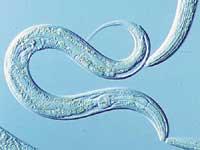Why do we age?
Many scientists seek the answer to this question, but still do not know why living beings age. Now, researchers at Standford University have presented a paper that will help understand the aging process.

Researchers have worked with the nematode Caenorhabditis elegans, whose genome is well known and has few genes, making research easier than with other organisms. According to this study, less than 1% of genes are associated with aging. It seems that as cells age, few genes lose effectiveness. But when those genes fail, the influence is evident.
The proteins that encode these genes are essential for folding other proteins well. Keep in mind that the appearance of proteins is directly related to their function. Therefore, over time, errors accumulate and in the end the cell is not able to perform its functions and dies.





